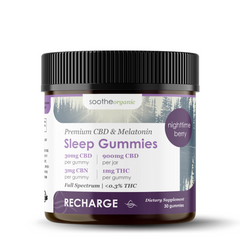Sleep is often seen as a luxury rather than a necessity in today's busy world. As we juggle daily responsibilities and attempt to maintain a work-life balance, the quest for a restful night's sleep is more important than ever. Luckily, that's precisely where cannabidiol (CBD) can come into play.
Cannabidiol, or CBD, became popular among health and wellness enthusiasts thanks to its potential therapeutic applications. It is a naturally occurring compound found in cannabis plants, but unlike its notorious cousin, THC, it does not cause any intoxicating effects.
The article below examines the scientific and anecdotal evidence supporting CBD’s role in improving sleep quality. Below, you will also find more information about factors that influence the efficacy of CBD in promoting restful slumber, along with potential side effects and recommended dosages.
Key Takeaways
- CBD interacts with the endocannabinoid system, potentially increasing adenosine levels and reducing anxiety, inflammation, and pain that can interfere with restful sleep.
- The optimal dosage of CBD for sleep improvement varies, and it is recommended to start with a low dose and gradually increase until the desired effects are achieved.
- Combining CBD with other natural sleep aids such as valerian root, melatonin, and chamomile can further enhance its effectiveness.
- While CBD is generally considered safe, potential side effects may occur, such as dry mouth, drowsiness, lightheadedness, changes in appetite, and diarrhea.
- Following the principles of proper sleep hygiene, such as maintaining a consistent sleep schedule and creating a relaxing bedtime routine, can also help improve sleep quality.
Understanding Sleep Disorders
Sleep disorders encompass many conditions that affect an individual's ability to achieve quality sleep. They include, but are not limited to:
- insomnia,
- restless leg syndrome (RLS),
- narcolepsy,
- sleep apnea
- REM sleep behavior disorder.
These conditions are often linked to neurotransmitter imbalances or disruptions in regulating sleep-wake cycles.

Sleep disorders can be caused by various factors, including stress, anxiety, inflammation, poor diet, excessive caffeine intake, or even underlying health issues. Identifying the root cause of a sleep disorder is essential to address it effectively. Still, trying natural solutions like the best sleep gummies that have proven effective for millions worldwide may be beneficial.
The Science Behind Sleep Gummies CBD and Sleep
The relationship between CBD and sleep exists primarily due to its effects on the body's endocannabinoid system (ECS). This complex cell-signaling system maintains overall balance within the body — including sleep regulation. CBD interacts with ECS receptors, which can modulate the release of various neurotransmitters.
One such neurotransmitter is adenosine, which accumulates during the day and promotes sleep by inhibiting neural activity. While more research is still needed, it is believed that CBD may increase adenosine levels and, as a result, encourage relaxation. Additionally, CBD can reduce anxiety, inflammation, and pain, which can interfere with restful sleep.
Using products such as CBD softgels and CBD gummies infused with extra melatonin can be effective for many people. CBD is a natural and safe substance worth trying before reaching for prescription sleep medication that often leads to dependency.
CBD enthusiasts can also try products such as CBD drinks, CBD tinctures, or even CBD topicals that can support overall relaxation and promote a good night's sleep
How CBD Can Interact with Our Sleep Cycle
The human sleep cycle has distinct stages, including rapid eye movement (REM) and non-REM (NREM) sleep. During NREM sleep, our bodies undergo restorative processes, while REM sleep plays a crucial role in memory consolidation and emotional processing.
CBD's interaction with the ECS might have an impact on these processes. As mentioned earlier, it can increase adenosine levels, which promotes relaxation and enhances sleep quality. Moreover, CBD can help reduce the time spent in REM sleep, potentially minimizing the occurrence of nightmares and other sleep disturbances related to emotional processing.
Finding the Right CBD Dosage and Delivery Method for Your Needs
The optimal dosage of CBD for sleep improvement will vary depending on factors such as body weight, individual tolerance, and the severity of the sleep disorder. As a general guideline, starting with a low dose (e.g., 5-10 mg) and gradually increasing until desired effects are achieved is recommended.
Various methods of CBD consumption are available, including CBD tinctures, softgels, gummies, and. Each method offers its onset time, duration of effects, and bioavailability.
Sublingual (under the tongue) administration or edibles like CBD gummies are commonly preferred for improving sleep due to their longer-lasting effects. However, it's essential to remember that CBD is not a magical, one-size-fits-all solution that will work the same for everyone.
This means that even if your friends or family members report enhanced sleep quality after munching on CBD gummies before bed, the same may not immediately happen for you. For CBD to be genuinely effective, you should also follow the principles of proper sleep hygiene, which include:
- Maintain a consistent sleep schedule. Going to bed and waking up simultaneously each day, including weekends, helps regulate the body's internal clock and improves sleep quality.
- Create a relaxing bedtime routine. Calming activities before bed, such as reading, taking a warm bath, or practicing meditation, can signal the body that it's time for sleep.
- Optimize your sleep environment. Ensure your bedroom is calm, dark, and quiet. Consider using blackout curtains, white noise machines, or earplugs and maintaining a comfortable room temperature.
- Limit exposure to screens before bedtime. Blue light emitted by electronic devices can disrupt melatonin production, the hormone responsible for regulating sleep-wake cycles. Aim to stop using screens at least one hour before bedtime.
- Be mindful of caffeine intake. Caffeine is a stimulant that can interfere with sleep if consumed too close to bedtime.
- Limit daytime naps. While short naps can provide a temporary energy boost, prolonged or frequent naps can interfere with nighttime sleep. Aim for 20-30 minutes in the early afternoon if you must nap.
Potential Side Effects
While CBD's potential benefits have garnered considerable attention, it's essential to be aware of the possible side effects and precautions associated with its use.

Some individuals may experience adverse reactions, which can range from mild to more severe depending on factors such as dosage, individual sensitivity, and method of consumption.
Potential side effects:
- Dry mouth. CBD may cause a reduction in saliva production, leading to a dry or cottonmouth sensation. Staying well-hydrated can help alleviate this symptom.
- Drowsiness. Although drowsiness can be a desired effect when using CBD for sleep, it may be inconvenient during the daytime. Adjusting the dosage or timing of consumption can help minimize this side effect.
- Lightheadedness. Some individuals may experience lightheadedness or dizziness when using CBD, particularly at higher doses. This side effect is often temporary and can be mitigated by reducing the dose or lying down until the sensation subsides.
- Changes in appetite. CBD has been reported to affect appetite in some users, resulting in either an increase or decrease in food intake. Monitoring dietary habits and adjusting the dosage accordingly can help manage this side effect.
- Diarrhea. In some cases, high doses of CBD may cause gastrointestinal discomfort and diarrhea. Reducing the dose or switching to a different method of consumption may help alleviate these symptoms.
While CBD is generally considered safe and well-tolerated, it's crucial to be aware of potential side effects. Always start with a low dose and gradually increase as needed while closely monitoring for any adverse reactions.
Combining CBD with Other Natural Sleep Aids
When seeking a holistic approach to improving sleep quality, it is essential to explore other natural sleep aids that can be used alongside CBD. Here are the options you can consider:
Valerian Root
Valerian root has been utilized as a natural remedy for centuries in treating an array of ailments, including sleep disorders. This herb is known for its sedative effects and ability to reduce the time it takes to fall asleep.
Its calming properties are attributed to the presence of compounds called valepotriates which interact with the body's gamma-aminobutyric acid (GABA) receptors, inducing relaxation.
When combined with CBD, valerian root may provide a synergistic effect that promotes better sleep. Both substances work harmoniously to alleviate anxiety and foster tranquility, making it easier for the body to transition into a restful state.
Melatonin
Melatonin is another natural supplement widely recognized for its role in regulating our circadian rhythm and promoting sleep. This hormone is produced by the pineal gland in response to darkness and helps signal our bodies when it is time for rest. Melatonin supplements are often used to address jet lag or sleep disturbances caused by shift work.
You can take products such as CBD gummies or CBD softgels infused with melatonin to experience the benefits of both substances at once.
Chamomile
Chamomile is a widely recognized herb known for its calming properties and ability to promote relaxation. Its gentle sleep-inducing effects are attributed to the presence of an antioxidant called apigenin that binds to certain receptors in the brain, promoting tranquility.

Pairing chamomile with CBD could offer a compelling combination for those seeking a gentle approach to improving sleep quality. Consuming a cup of chamomile tea with a few drops of CBD tincture may provide a synergistic effect that enhances their benefits.
In Conclusion
CBD has emerged as a promising natural remedy for sleep disorders, offering a safe and natural alternative to conventional sleep medications. Its interaction with the endocannabinoid system and potential to increase adenosine levels can promote relaxation and improve sleep quality.
Combining CBD with other natural sleep aids, such as valerian root, melatonin, and chamomile, can further enhance its effectiveness. While it's crucial to be aware of potential side effects and precautions, starting with a low dose and gradually increasing as needed can mitigate risks.
For a more holistic approach, remember to follow the principles of sleep hygiene to achieve the restful slumber you deserve!
CBD for gout, Organic sleep gummies, CBD mood swings, CBD sleep apnea, CBD stores casper wy, CBD, CBD casper wy broad spectrum cbd, full spectrum cbd , sleep gummies, cbd softgels, organic cbd salve, delta 9 gummies, best delta 9 gummies, thcv gummies, cbd gummies for anxiety, full spectrum vs broad spectrum CBD, broad spectrum CBD oil, USDA organic CBD, gummies for sleep, best CBD oil for pain, CBD softgels 25mg, best CBD oil for dogs, delta 9 gummies near me, CBD oil Wyoming, Wyoming CBD gummies, CBD energy drink, best sleep gummies, best THCv gummies, focus gummies, 1000mg CBD, 750mg gummies, muscle rub, CBD cream 1000mg, healing salve, vegan gummies, CBG tincture, Organic sleep gummies, CBD sleep apnea, strongest CBD gummies, gummies for sleep, best sleep gummies, sleep gummies for adults, nano CBD, nano CBD softgels, full spectrum CBD softgels, broad spectrum CBD softgels, green spectrum CBD gummies, CBD energy drinks, CBD mocktails, CBD for muscle recovery, CBD for better sleep, is CBD legal in Wyoming, best CBD Casper, CBD gummies Casper, THCv gummies Casper, CBD tinctures Wyoming, delta 9 gummies Wyoming, best CBD softgels Wyoming, CBD oil Casper Wyoming, Casper CBD store, CBD gummies Casper, CBD tinctures Casper, Hemp-derived CBD Casper, CBD products in Casper, Best CBD shop Casper, CBD capsules Casper Wyoming, Casper CBD hemp products, CBD for sale Casper, Wyoming Weed Laws, CBD Sports Cream, CBD Casper WY, CBD Cheyenne, Can you buy cbd oil in Wyoming, CBD Wyoming, thcv gummies effects, Best cbd for dogs, CBD Drinks, Buy cbd drinks online






